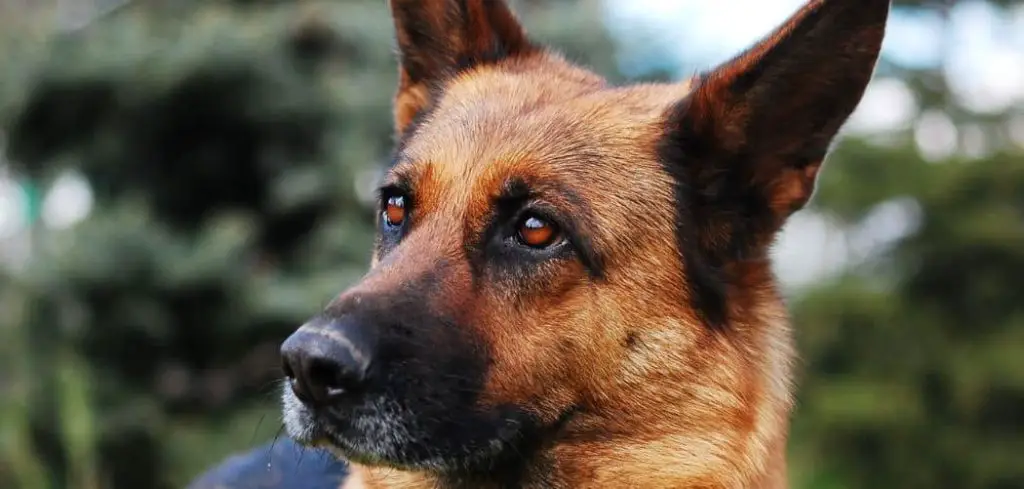Coughing in old dogs can be unsettling, especially if it lingers or comes on suddenly. It may sound like a harmless tickle, but in senior dogs, coughing often points to an underlying health issue that needs attention.
We outline the common causes of coughing in old dogs, what you can do at home, and when to seek veterinary help.
Old Dog Coughing — Why It Happens
Coughing in older dogs often stems from heart disease, respiratory infections, tracheal collapse, kennel cough, or even lung problems such as chronic bronchitis.
As dogs age, their immune systems weaken, making them more prone to respiratory illness. Heart issues can also develop with age, leading to fluid buildup that triggers persistent coughing.
In some cases, the cough comes from airway irritation or structural changes in the throat and windpipe.

Old Dog Coughing: Common Causes
Heart Disease
One of the most concerning causes of coughing in senior dogs is heart disease. When the heart cannot pump efficiently, fluid may back up into the lungs, causing a deep, persistent cough.
Owners often describe this as a wet or congested-sounding cough, especially at night or after exercise. You may also notice fatigue, weakness, or difficulty breathing alongside the cough.
Heart-related coughing in old dogs should always be taken seriously, as it indicates the heart is struggling and veterinary care is essential.
Read more: Old Dog Coughing and Gagging (Explained)
Chronic Bronchitis
Chronic bronchitis is another common cause of coughing in older dogs. Over time, the airways become inflamed and produce excess mucus, leading to frequent, harsh coughing.
This condition often develops slowly, and you may notice the cough getting worse over months. It usually sounds dry and hacking, and it may worsen with excitement or activity.
While not immediately life-threatening, chronic bronchitis reduces your dog’s comfort and quality of life. It requires veterinary management to control inflammation and help your dog breathe easier.
Tracheal Collapse
Tracheal collapse is especially common in small breed senior dogs. The trachea, or windpipe, weakens with age and can partially collapse, causing a loud, honking cough.
This type of cough often worsens when your dog pulls on the leash, gets excited, or after drinking water. In severe cases, you may also notice gagging or labored breathing.
Tracheal collapse can be managed with medications, lifestyle changes, and in some cases surgery, but it always needs veterinary diagnosis.
Respiratory Infections
Even in old age, dogs are still vulnerable to infections such as kennel cough, pneumonia, or viral respiratory illnesses.
An infection-related cough often appears suddenly and may come with fever, nasal discharge, or loss of appetite. Pneumonia, in particular, can cause both coughing and labored breathing.
Because old dogs have weaker immune systems, infections can quickly become serious and require veterinary treatment.
Lung Cancer
Unfortunately, coughing in old dogs can sometimes be a sign of lung tumors. Cancer may develop directly in the lungs or spread from elsewhere in the body.
A cancer-related cough may be persistent, dry, and sometimes accompanied by weight loss, lethargy, or labored breathing.
While not the most common cause, lung cancer in senior dogs is a possibility that vets will rule out if other conditions don’t explain the cough.
Allergies and Environmental Irritants
Just like people, dogs can react to dust, pollen, smoke, or chemicals in the environment. These irritants can trigger coughing, especially in older dogs with sensitive airways.
This type of cough may come and go, depending on exposure. It usually isn’t accompanied by major systemic illness but can still make your dog uncomfortable.
Simple changes like reducing smoke exposure or using air filters can sometimes ease this type of cough, but veterinary input is still recommended to rule out more serious causes.
What to Do If Your Old Dog Is Coughing
If your old dog has a mild, occasional cough but otherwise seems normal, you can monitor them closely at home for a short period. Ensure they have fresh water, a calm environment, and avoid irritants like smoke or strong cleaning products.
For dogs with chronic issues like tracheal collapse, using a harness instead of a collar can reduce airway pressure. Keeping your dog at a healthy weight also lessens strain on both the lungs and heart.
If allergies are suspected, reducing exposure to triggers and maintaining a clean home can help minimize symptoms.
However, because coughing in old dogs often points to heart or lung disease, it’s important not to rely only on home care. A veterinary exam is the safest way to understand what’s going on.
When to Call or Visit Your Vet
You should seek veterinary care right away if your old dog’s coughing is frequent, worsening, or paired with other concerning symptoms.
Call your vet if your dog:
Coughs persistently or has a harsh, honking cough.
Shows signs of labored or noisy breathing.
Coughs up blood or foam.
Has trouble sleeping at night due to coughing.
Appears weak, lethargic, or loses weight.
Because coughing in older dogs often links to heart or lung disease, early diagnosis and treatment can make a major difference in both quality of life and longevity.
Read more: Old Dog Breathing Heavy and Not Eating (Here’s why)
Key Takeaway
Coughing in an old dog may seem like a minor irritation, but it often signals deeper health issues such as heart disease, bronchitis, infections, or airway problems.
While occasional, mild coughing can sometimes be monitored at home, persistent or severe coughing always requires veterinary attention. With proper diagnosis and treatment, many old dogs with coughing can live comfortably and maintain a good quality of life.
Your quick response and attentiveness can make all the difference in keeping your senior companion safe and healthy.
